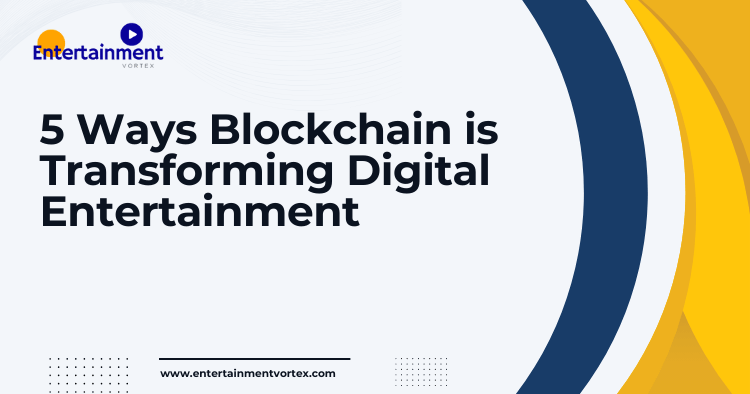Table of Contents
- Introduction
- 1. Enhanced Security and Ownership
- 2. Transparent Royalty Distribution
- 3. Decentralized Content Creation
- 4. Fan Engagement and Community Building
- 5. Innovative Monetization Models
- Conclusion
- FAQs
Introduction
Blockchain technology is making waves across various industries, and the digital entertainment sector is no exception. With its decentralized nature and advanced security features, blockchain is redefining how content is created, distributed, and consumed. In this blog post, we’ll explore five ways blockchain is transforming digital entertainment, shedding light on its impact on creators, consumers, and the industry as a whole.
1. Enhanced Security and Ownership
One of the most significant advantages of blockchain technology is its ability to provide robust security features. In the digital entertainment world, where piracy and unauthorized distribution are rampant, blockchain serves as a reliable solution.
“Blockchain serves as a fortress for digital content, ensuring that creators’ rights are safeguarded in an age of rampant piracy.”
How Blockchain Enhances Security:
- Immutable Records: Once a transaction is recorded on the blockchain, it cannot be altered. This ensures that ownership and distribution rights are securely documented.
- Smart Contracts: These self-executing contracts automate agreements between parties. For example, creators can set terms for usage rights, ensuring they receive compensation as soon as their work is used.
Visual Element:
| Feature | Benefit |
|---|---|
| Immutable Records | Protects against copyright infringement |
| Smart Contracts | Automates payment and usage rights |
With these features, artists and content creators can confidently share their work knowing that their ownership is protected.
2. Transparent Royalty Distribution
The traditional music and entertainment industries have long been plagued by opaque royalty distribution systems. Blockchain technology offers a transparent alternative that allows artists to track their earnings in real-time.
“Imagine being able to see every dollar earned from your work, right as it happens. Blockchain makes that possible.”
Benefits of Transparent Royalties:
- Real-time Tracking: With blockchain, artists can see exactly how much they earn from each stream or download.
- Reduced Intermediaries: By cutting out middlemen, artists can receive a larger share of their earnings directly from consumers.
Platforms like Audius are already implementing blockchain to ensure that artists receive fair compensation. For more on this topic, check out Audius’s official site.
3. Decentralized Content Creation
Blockchain is enabling a shift toward decentralized content creation, allowing creators to collaborate without relying on traditional publishing houses or studios.
“Decentralization is empowering creators to take control of their narratives and connect directly with their audiences.”
Advantages of Decentralization:
- Direct Access to Audiences: Creators can distribute their work directly to fans, bypassing traditional gatekeepers.
- Crowdfunding Opportunities: Blockchain allows for innovative funding models, such as Initial Coin Offerings (ICOs), where fans can invest in a project before it’s completed.
Case Study:
Projects like “The DAO” have successfully raised millions through crowdfunding, demonstrating the potential of decentralized funding in the entertainment sector.
4. Fan Engagement and Community Building
Blockchain technology fosters a more engaged fan base by creating new ways for fans to interact with their favorite artists.
“Fans are no longer just spectators; they can now be active participants in the creative process.”
How Blockchain Enhances Fan Engagement:
- Token-based Communities: Artists can issue tokens that fans can earn through participation, creating a sense of belonging and loyalty.
- Exclusive Content Access: By using blockchain, artists can offer limited-edition content or experiences to token holders, enhancing fan engagement.
For instance, platforms like Rally enable creators to build their own tokens, providing fans with unique perks. Learn more about Rally.
5. Innovative Monetization Models
As the digital landscape evolves, so do the monetization strategies for content creators. Blockchain opens the door to innovative models that can benefit both creators and consumers.
“The future of monetization is here, and it’s more flexible and rewarding than ever before.”
Emerging Monetization Strategies:
- Pay-per-Use Models: Blockchain allows for micropayments, enabling consumers to pay small amounts for individual pieces of content rather than subscribing to an entire service.
- NFTs (Non-Fungible Tokens): Artists can sell unique digital assets (such as artwork or music) directly to fans, creating a new revenue stream.
Visual Element:
| Monetization Model | Description |
|---|---|
| Pay-per-Use | Charges consumers for individual content usage |
| NFTs | Unique digital assets sold directly to fans |
By leveraging these models, creators can diversify their income streams and reach new audiences.
Conclusion
Blockchain technology is ushering in a new era for digital entertainment, offering enhanced security, transparency, and innovative monetization strategies. As artists and consumers continue to embrace this technology, we can expect the digital entertainment landscape to evolve in exciting new ways.
FAQs
Q: What is blockchain technology?
A: Blockchain is a decentralized digital ledger that records transactions across many computers. It ensures that the recorded transactions cannot be altered retroactively.
Q: How does blockchain prevent piracy?
A: By providing immutable ownership records and smart contracts, blockchain ensures that creators retain control over their work, making it more difficult for unauthorized copies to circulate.
Q: Are there any successful examples of blockchain in entertainment?
A: Yes! Platforms like Audius and Rally have successfully implemented blockchain to benefit artists and fans alike.
Q: Can blockchain help reduce the costs for consumers?
A: Absolutely. With pay-per-use models and reduced intermediary fees, blockchain can lead to lower costs for consumers while ensuring that creators receive fair compensation.
By understanding the transformative role of blockchain in digital entertainment, both creators and consumers can navigate this evolving landscape with confidence and excitement. Also look for related topics such as 10 Creative Ways to Turn Hobbies into Profitable Side Hustles for inspiration on monetization and community engagement strategies.






